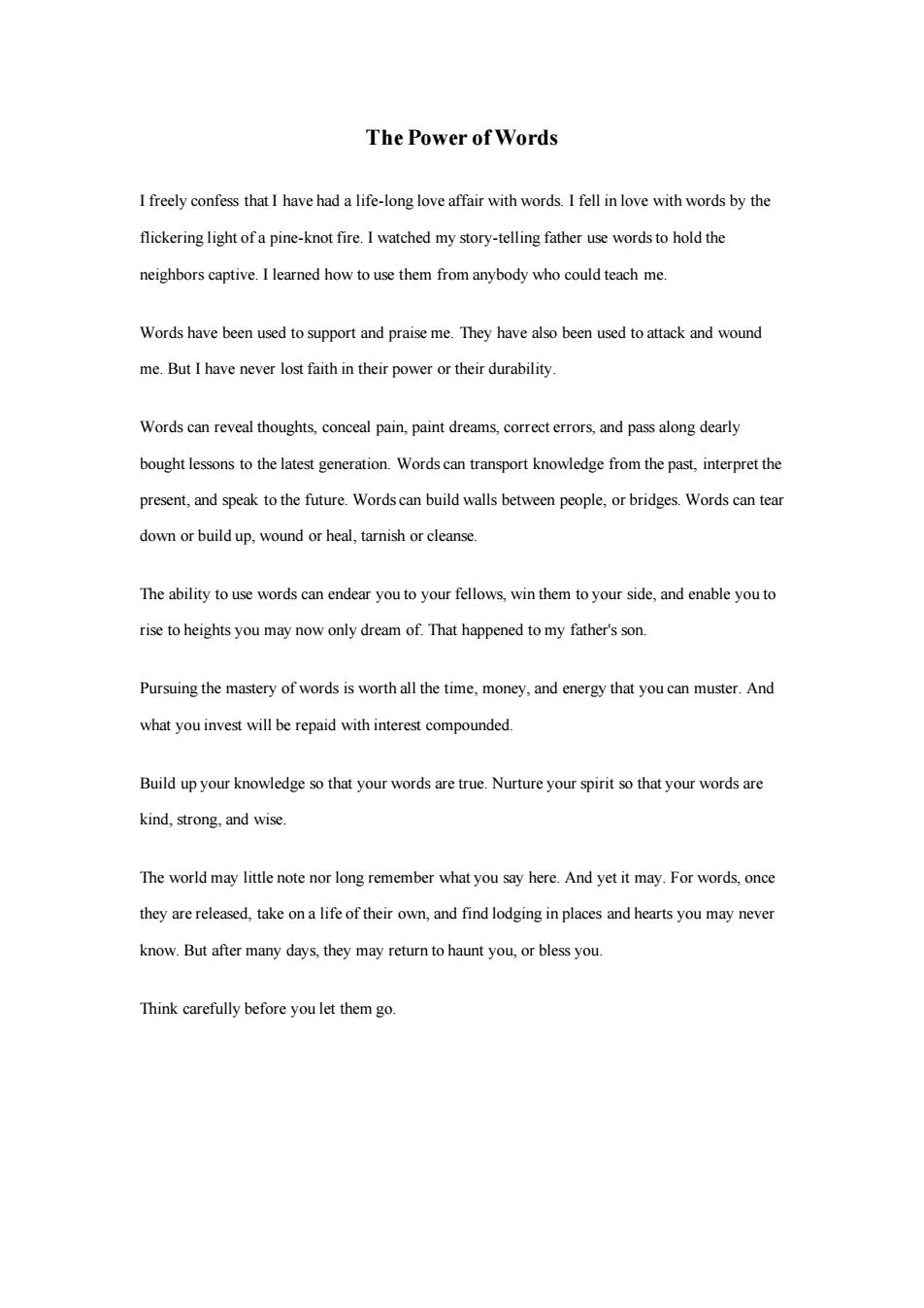
The Power of Words I freely confess that I have had a life-long love affair with words.I fell in love with words by the flickering light of a pine-knot fire.I watched my story-telling father use words to hold the neighbors captive.I learned how to use them from anybody who could teach me. Words have been used to support and praise me.They have also been used to attack and wound me.But I have never lost faith in their power or their durability. Words can reveal thoughts,conceal pain,paint dreams,correct errors,and pass along dearly bought lessons to the latest generation.Words can transport knowledge from the past,interpret the present,and speak to the future.Words can build walls between people,or bridges.Words can tear down or build up,wound or heal,tarnish or cleanse. The ability to use words can endear you to your fellows,win them to your side,and enable you to rise to heights you may now only dream of.That happened to my father's son. Pursuing the mastery of words is worth all the time,money,and energy that you can muster.And what you invest will be repaid with interest compounded. Build up your knowledge so that your words are true.Nurture your spirit so that your words are kind,strong,and wise. The world may little note nor long remember what you say here.And yet it may.For words,once they are released,take on a life of their own,and find lodging in places and hearts you may never know.But after many days,they may return to haunt you,or bless you. Think carefully before you let them go
The Power of Words I freely confess that I have had a life-long love affair with words. I fell in love with words by the flickering light of a pine-knot fire. I watched my story-telling father use words to hold the neighbors captive. I learned how to use them from anybody who could teach me. Words have been used to support and praise me. They have also been used to attack and wound me. But I have never lost faith in their power or their durability. Words can reveal thoughts, conceal pain, paint dreams, correct errors, and pass along dearly bought lessons to the latest generation. Words can transport knowledge from the past, interpret the present, and speak to the future. Words can build walls between people, or bridges. Words can tear down or build up, wound or heal, tarnish or cleanse. The ability to use words can endear you to your fellows, win them to your side, and enable you to rise to heights you may now only dream of. That happened to my father's son. Pursuing the mastery of words is worth all the time, money, and energy that you can muster. And what you invest will be repaid with interest compounded. Build up your knowledge so that your words are true. Nurture your spirit so that your words are kind, strong, and wise. The world may little note nor long remember what you say here. And yet it may. For words, once they are released, take on a life of their own, and find lodging in places and hearts you may never know. But after many days, they may return to haunt you, or bless you. Think carefully before you let them go
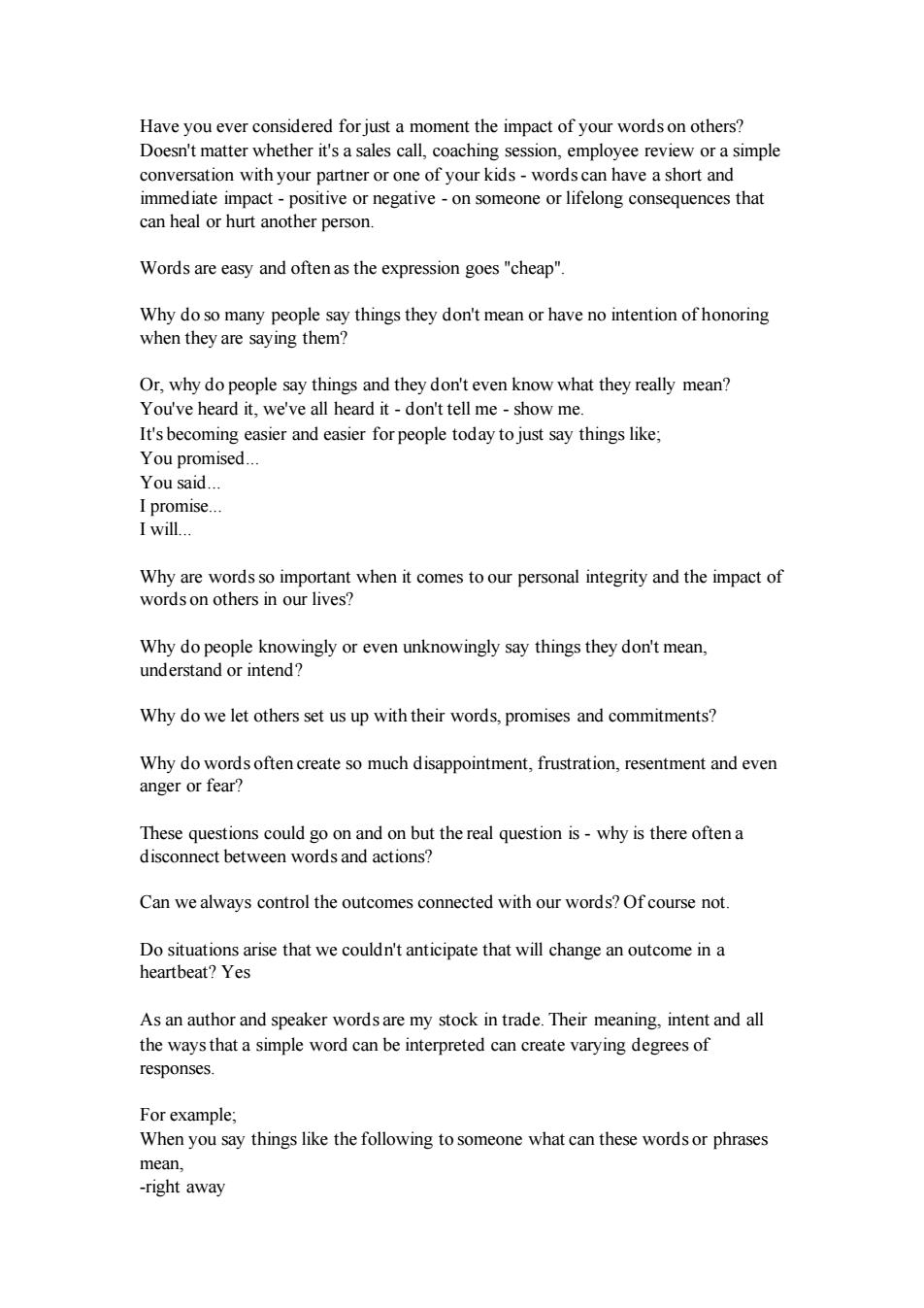
Have you ever considered for just a moment the impact of your words on others? Doesn't matter whether it's a sales call,coaching session,employee review or a simple conversation with your partner or one of your kids-words can have a short and immediate impact-positive or negative-on someone or lifelong consequences that can heal or hurt another person. Words are easy and often as the expression goes "cheap". Why do so many people say things they don't mean or have no intention of honoring when they are saying them? Or,why do people say things and they don't even know what they really mean? You've heard it,we've all heard it-don't tell me-show me. It's becoming easier and easier for people today to just say things like; You promised... You said... I promise... I will... Why are words so important when it comes to our personal integrity and the impact of words on others in our lives? Why do people knowingly or even unknowingly say things they don't mean, understand or intend? Why do we let others set us up with their words,promises and commitments? Why do words often create so much disappointment,frustration,resentment and even anger or fear? These questions could go on and on but the real question is-why is there often a disconnect between words and actions? Can we always control the outcomes connected with our words?Of course not. Do situations arise that we couldn't anticipate that will change an outcome in a heartbeat?Yes As an author and speaker words are my stock in trade.Their meaning,intent and all the ways that a simple word can be interpreted can create varying degrees of responses. For example; When you say things like the following to someone what can these words or phrases mean, -right away
Have you ever considered for just a moment the impact of your words on others? Doesn't matter whether it's a sales call, coaching session, employee review or a simple conversation with your partner or one of your kids - words can have a short and immediate impact - positive or negative - on someone or lifelong consequences that can heal or hurt another person. Words are easy and often as the expression goes "cheap". Why do so many people say things they don't mean or have no intention of honoring when they are saying them? Or, why do people say things and they don't even know what they really mean? You've heard it, we've all heard it - don't tell me - show me. It's becoming easier and easier for people today to just say things like; You promised... You said... I promise... I will... Why are words so important when it comes to our personal integrity and the impact of words on others in our lives? Why do people knowingly or even unknowingly say things they don't mean, understand or intend? Why do we let others set us up with their words, promises and commitments? Why do words often create so much disappointment, frustration, resentment and even anger or fear? These questions could go on and on but the real question is - why is there often a disconnect between words and actions? Can we always control the outcomes connected with our words? Of course not. Do situations arise that we couldn't anticipate that will change an outcome in a heartbeat? Yes As an author and speaker words are my stock in trade. Their meaning, intent and all the ways that a simple word can be interpreted can create varying degrees of responses. For example; When you say things like the following to someone what can these words or phrases mean, -right away
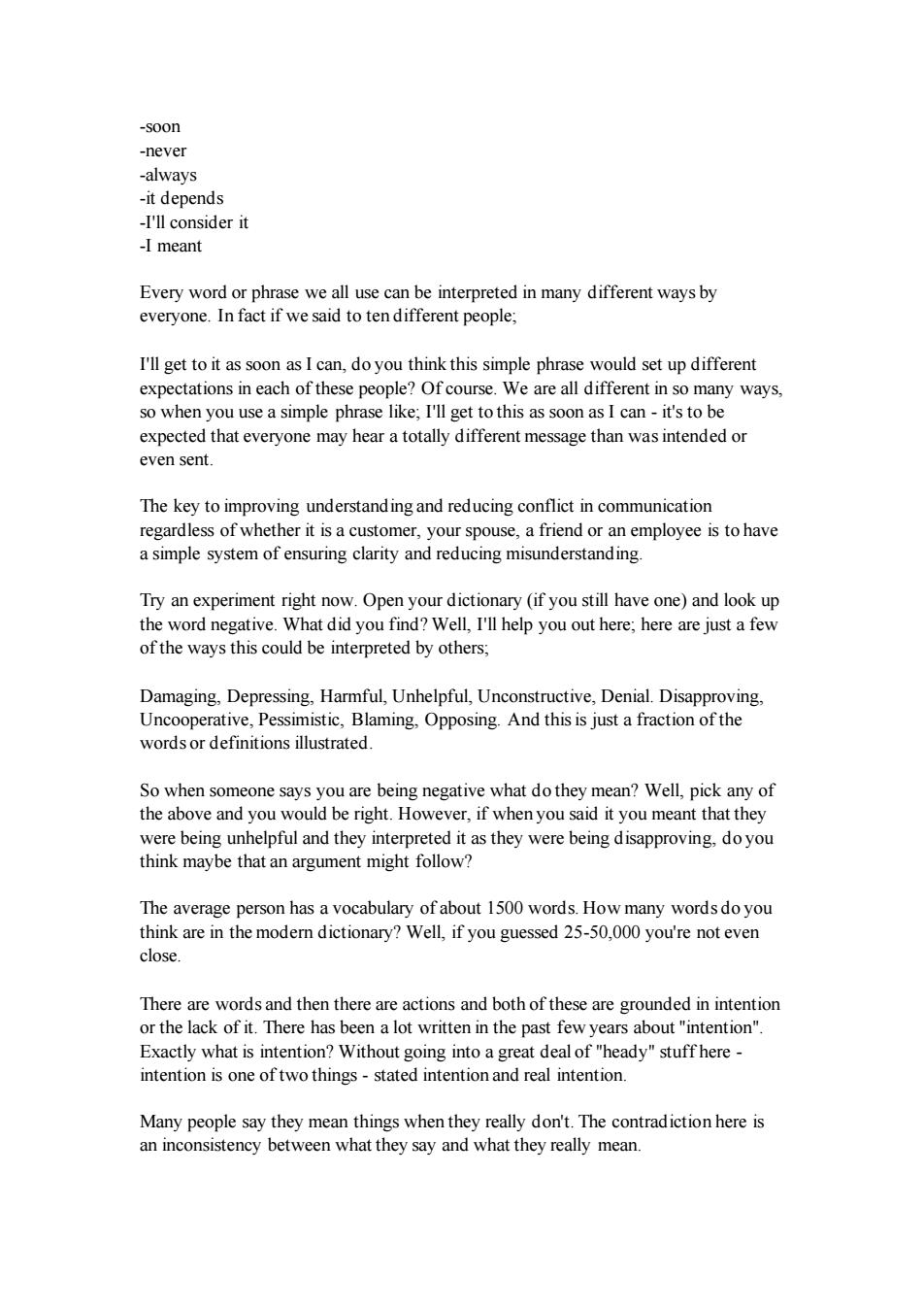
-soon -never -always -it depends -I'll consider it -I meant Every word or phrase we all use can be interpreted in many different ways by everyone.In fact if we said to ten different people; I'll get to it as soon as I can,do you think this simple phrase would set up different expectations in each of these people?Of course.We are all different in so many ways, so when you use a simple phrase like;I'll get to this as soon as I can-it's to be expected that everyone may hear a totally different message than was intended or even sent The key to improving understanding and reducing conflict in communication regardless of whether it is a customer,your spouse,a friend or an employee is to have a simple system of ensuring clarity and reducing misunderstanding. Try an experiment right now.Open your dictionary(if you still have one)and look up the word negative.What did you find?Well,I'll help you out here;here are just a few of the ways this could be interpreted by others; Damaging,Depressing,Harmful,Unhelpful,Unconstructive,Denial.Disapproving, Uncooperative,Pessimistic,Blaming,Opposing.And this is just a fraction of the words or definitions illustrated. So when someone says you are being negative what do they mean?Well,pick any of the above and you would be right.However,if when you said it you meant that they were being unhelpful and they interpreted it as they were being disapproving,do you think maybe that an argument might follow? The average person has a vocabulary of about 1500 words.How many words do you think are in the modern dictionary?Well,if you guessed 25-50,000 you're not even close There are words and then there are actions and both of these are grounded in intention or the lack of it.There has been a lot written in the past few years about"intention". Exactly what is intention?Without going into a great deal of"heady"stuff here- intention is one of two things-stated intention and real intention. Many people say they mean things when they really don't.The contradiction here is an inconsistency between what they say and what they really mean
-soon -never -always -it depends -I'll consider it -I meant Every word or phrase we all use can be interpreted in many different ways by everyone. In fact if we said to ten different people; I'll get to it as soon as I can, do you think this simple phrase would set up different expectations in each of these people? Of course. We are all different in so many ways, so when you use a simple phrase like; I'll get to this as soon as I can - it's to be expected that everyone may hear a totally different message than was intended or even sent. The key to improving understanding and reducing conflict in communication regardless of whether it is a customer, your spouse, a friend or an employee is to have a simple system of ensuring clarity and reducing misunderstanding. Try an experiment right now. Open your dictionary (if you still have one) and look up the word negative. What did you find? Well, I'll help you out here; here are just a few of the ways this could be interpreted by others; Damaging, Depressing, Harmful, Unhelpful, Unconstructive, Denial. Disapproving, Uncooperative, Pessimistic, Blaming, Opposing. And this is just a fraction of the words or definitions illustrated. So when someone says you are being negative what do they mean? Well, pick any of the above and you would be right. However, if when you said it you meant that they were being unhelpful and they interpreted it as they were being disapproving, do you think maybe that an argument might follow? The average person has a vocabulary of about 1500 words. How many words do you think are in the modern dictionary? Well, if you guessed 25-50,000 you're not even close. There are words and then there are actions and both of these are grounded in intention or the lack of it. There has been a lot written in the past few years about "intention". Exactly what is intention? Without going into a great deal of "heady" stuff here - intention is one of two things - stated intention and real intention. Many people say they mean things when they really don't. The contradiction here is an inconsistency between what they say and what they really mean
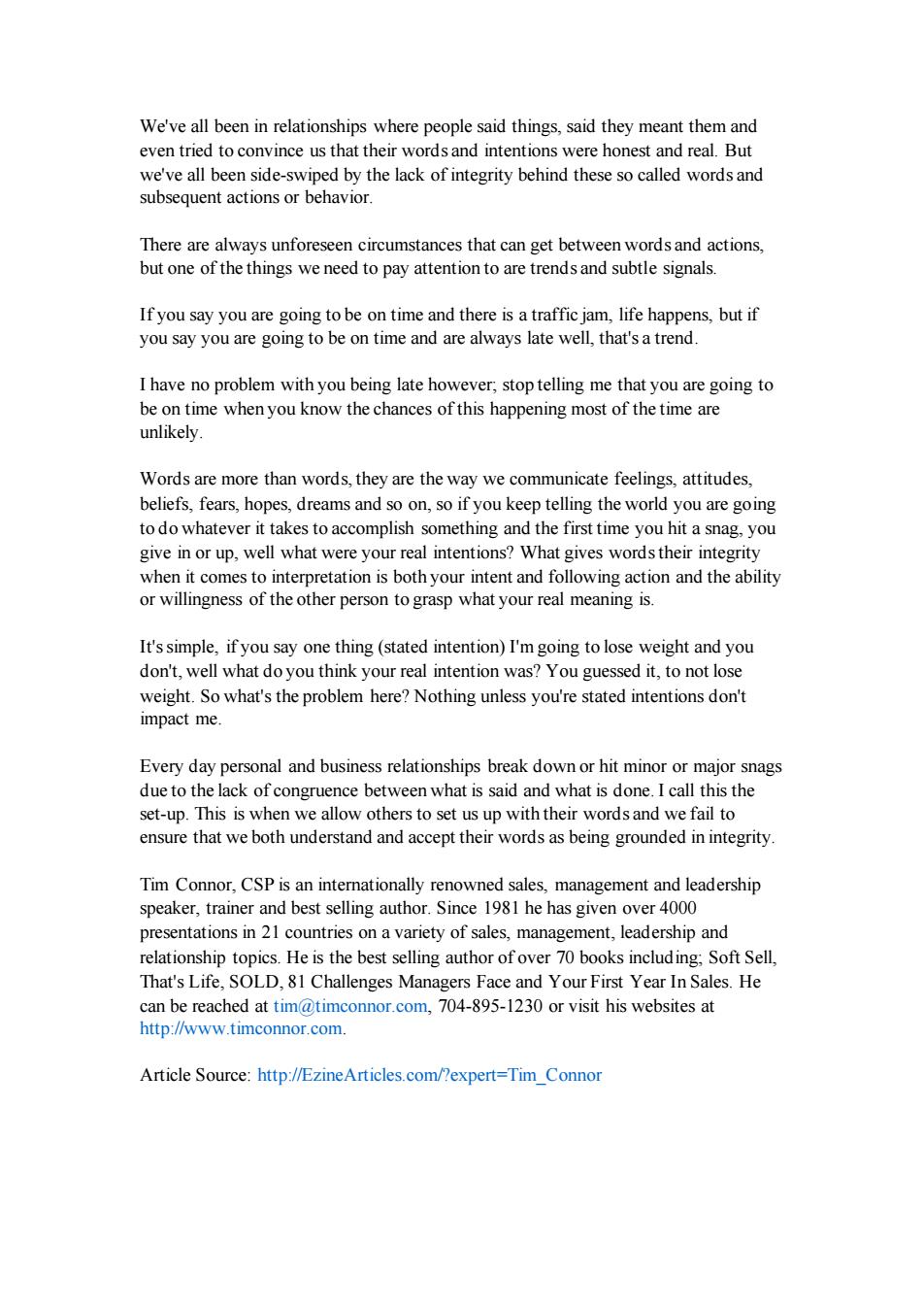
We've all been in relationships where people said things,said they meant them and even tried to convince us that their words and intentions were honest and real.But we've all been side-swiped by the lack of integrity behind these so called words and subsequent actions or behavior. There are always unforeseen circumstances that can get between words and actions, but one of the things we need to pay attention to are trends and subtle signals. If you say you are going to be on time and there is a traffic jam,life happens,but if you say you are going to be on time and are always late well,that's a trend. I have no problem with you being late however,stop telling me that you are going to be on time when you know the chances of this happening most of the time are unlikely. Words are more than words,they are the way we communicate feelings,attitudes, beliefs,fears,hopes,dreams and so on,so if you keep telling the world you are going to do whatever it takes to accomplish something and the first time you hit a snag,you give in or up,well what were your real intentions?What gives words their integrity when it comes to interpretation is both your intent and following action and the ability or willingness of the other person to grasp what your real meaning is. It's simple,if you say one thing(stated intention)I'm going to lose weight and you don't,well what do you think your real intention was?You guessed it,to not lose weight.So what's the problem here?Nothing unless you're stated intentions don't impact me. Every day personal and business relationships break down or hit minor or major snags due to the lack of congruence between what is said and what is done.I call this the set-up.This is when we allow others to set us up with their words and we fail to ensure that we both understand and accept their words as being grounded in integrity. Tim Connor,CSP is an internationally renowned sales,management and leadership speaker,trainer and best selling author.Since 1981 he has given over 4000 presentations in 21 countries on a variety of sales,management,leadership and relationship topics.He is the best selling author of over 70 books includ ing;Soft Sell, That's Life,SOLD,81 Challenges Managers Face and Your First Year In Sales.He can be reached at tim@timconnor.com,704-895-1230 or visit his websites at http://www.timconnor.com. Article Source:http://EzineArticles.com/?expert=Tim_Connor
We've all been in relationships where people said things, said they meant them and even tried to convince us that their words and intentions were honest and real. But we've all been side-swiped by the lack of integrity behind these so called words and subsequent actions or behavior. There are always unforeseen circumstances that can get between words and actions, but one of the things we need to pay attention to are trends and subtle signals. If you say you are going to be on time and there is a traffic jam, life happens, but if you say you are going to be on time and are always late well, that's a trend. I have no problem with you being late however; stop telling me that you are going to be on time when you know the chances of this happening most of the time are unlikely. Words are more than words, they are the way we communicate feelings, attitudes, beliefs, fears, hopes, dreams and so on, so if you keep telling the world you are going to do whatever it takes to accomplish something and the first time you hit a snag, you give in or up, well what were your real intentions? What gives words their integrity when it comes to interpretation is both your intent and following action and the ability or willingness of the other person to grasp what your real meaning is. It's simple, if you say one thing (stated intention) I'm going to lose weight and you don't, well what do you think your real intention was? You guessed it, to not lose weight. So what's the problem here? Nothing unless you're stated intentions don't impact me. Every day personal and business relationships break down or hit minor or major snags due to the lack of congruence between what is said and what is done. I call this the set-up. This is when we allow others to set us up with their words and we fail to ensure that we both understand and accept their words as being grounded in integrity. Tim Connor, CSP is an internationally renowned sales, management and leadership speaker, trainer and best selling author. Since 1981 he has given over 4000 presentations in 21 countries on a variety of sales, management, leadership and relationship topics. He is the best selling author of over 70 books including; Soft Sell, That's Life, SOLD, 81 Challenges Managers Face and Your First Year In Sales. He can be reached at tim@timconnor.com, 704-895-1230 or visit his websites at http://www.timconnor.com. Article Source: http://EzineArticles.com/?expert=Tim_Connor
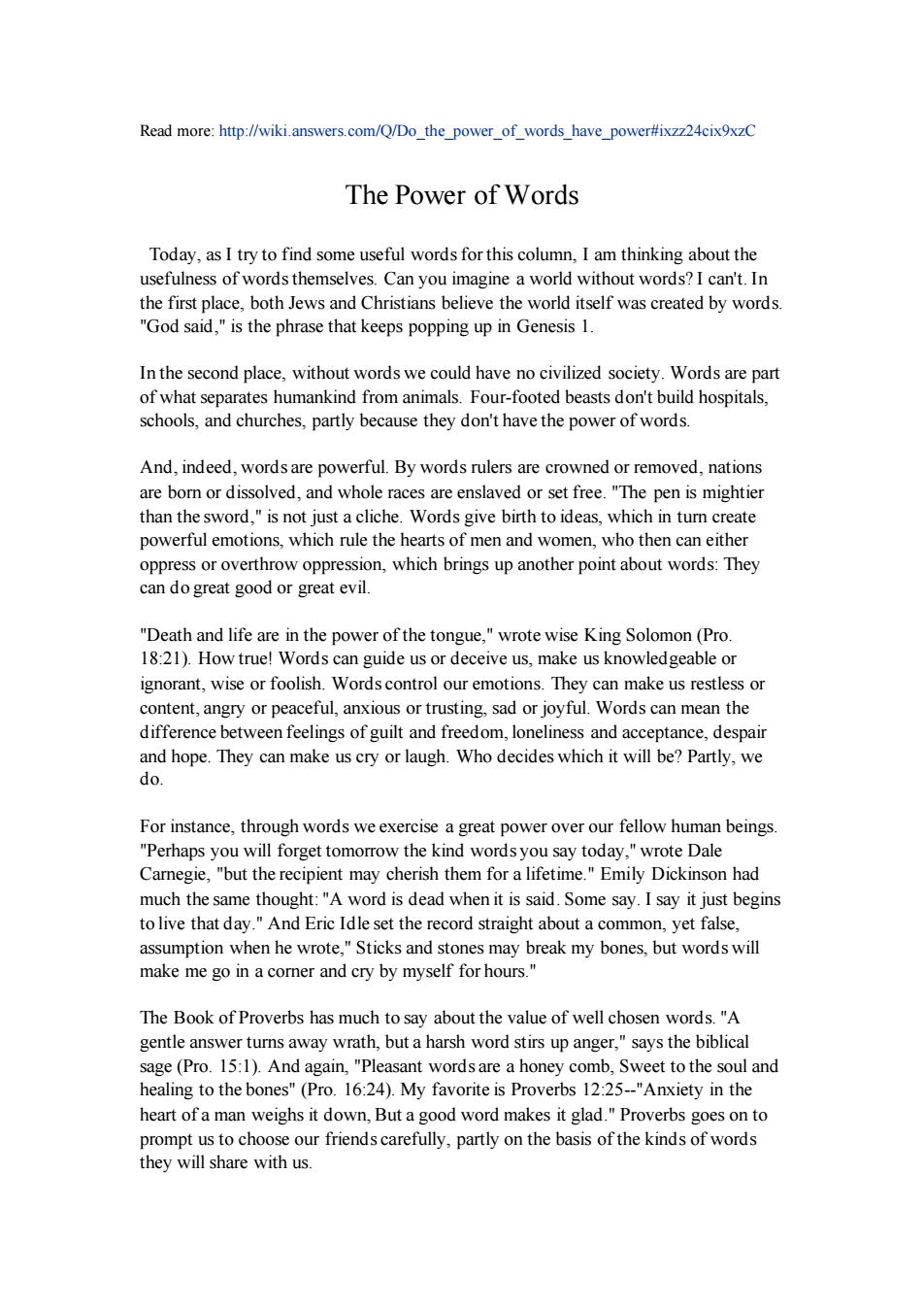
Read more:http://wiki.answers.com/Q/Do the power of words have power#ixzz24cix9xzC The Power of Words Today,as I try to find some useful words for this column,I am thinking about the usefulness of words themselves.Can you imagine a world without words?I can't.In the first place,both Jews and Christians believe the world itself was created by words "God said,is the phrase that keeps popping up in Genesis 1. In the second place,without words we could have no civilized society.Words are part of what separates humankind from animals.Four-footed beasts don't build hospitals, schools,and churches,partly because they don't have the power of words And,indeed,words are powerful.By words rulers are crowned or removed,nations are born or dissolved,and whole races are enslaved or set free."The pen is mightier than the sword,"is not just a cliche.Words give birth to ideas,which in turn create powerful emotions,which rule the hearts of men and women,who then can either oppress or overthrow oppression,which brings up another point about words:They can do great good or great evil. "Death and life are in the power of the tongue,"wrote wise King Solomon(Pro. 18:21).How true!Words can guide us or deceive us,make us knowledgeable or ignorant,wise or foolish.Words control our emotions.They can make us restless or content,angry or peaceful,anxious or trusting,sad or joyful.Words can mean the difference between feelings of guilt and freedom,loneliness and acceptance,despair and hope.They can make us cry or laugh.Who decides which it will be?Partly,we do. For instance,through words we exercise a great power over our fellow human beings. "Perhaps you will forget tomorrow the kind words you say today,"wrote Dale Carnegie,"but the recipient may cherish them for a lifetime."Emily Dickinson had much the same thought:"A word is dead when it is said.Some say.I say it just begins to live that day."And Eric Idle set the record straight about a common,yet false, assumption when he wrote,"Sticks and stones may break my bones,but words will make me go in a corner and cry by myself for hours." The Book of Proverbs has much to say about the value of well chosen words."A gentle answer turns away wrath,but a harsh word stirs up anger,"says the biblical sage (Pro.15:1).And again,"Pleasant words are a honey comb,Sweet to the soul and healing to the bones"(Pro.16:24).My favorite is Proverbs 12:25--"Anxiety in the heart of a man weighs it down,But a good word makes it glad."Proverbs goes on to prompt us to choose our friends carefully,partly on the basis of the kinds of words they will share with us
Read more: http://wiki.answers.com/Q/Do_the_power_of_words_have_power#ixzz24cix9xzC The Power of Words Today, as I try to find some useful words for this column, I am thinking about the usefulness of words themselves. Can you imagine a world without words? I can't. In the first place, both Jews and Christians believe the world itself was created by words. "God said," is the phrase that keeps popping up in Genesis 1. In the second place, without words we could have no civilized society. Words are part of what separates humankind from animals. Four-footed beasts don't build hospitals, schools, and churches, partly because they don't have the power of words. And, indeed, words are powerful. By words rulers are crowned or removed, nations are born or dissolved, and whole races are enslaved or set free. "The pen is mightier than the sword," is not just a cliche. Words give birth to ideas, which in turn create powerful emotions, which rule the hearts of men and women, who then can either oppress or overthrow oppression, which brings up another point about words: They can do great good or great evil. "Death and life are in the power of the tongue," wrote wise King Solomon (Pro. 18:21). How true! Words can guide us or deceive us, make us knowledgeable or ignorant, wise or foolish. Words control our emotions. They can make us restless or content, angry or peaceful, anxious or trusting, sad or joyful. Words can mean the difference between feelings of guilt and freedom, loneliness and acceptance, despair and hope. They can make us cry or laugh. Who decides which it will be? Partly, we do. For instance, through words we exercise a great power over our fellow human beings. "Perhaps you will forget tomorrow the kind words you say today," wrote Dale Carnegie, "but the recipient may cherish them for a lifetime." Emily Dickinson had much the same thought: "A word is dead when it is said. Some say. I say it just begins to live that day." And Eric Idle set the record straight about a common, yet false, assumption when he wrote," Sticks and stones may break my bones, but words will make me go in a corner and cry by myself for hours." The Book of Proverbs has much to say about the value of well chosen words. "A gentle answer turns away wrath, but a harsh word stirs up anger," says the biblical sage (Pro. 15:1). And again, "Pleasant words are a honey comb, Sweet to the soul and healing to the bones" (Pro. 16:24). My favorite is Proverbs 12:25--"Anxiety in the heart of a man weighs it down, But a good word makes it glad." Proverbs goes on to prompt us to choose our friends carefully, partly on the basis of the kinds of words they will share with us

And what about the words we tell ourselves?What words do you and I say to ourselves inside our heads where only we can hear(For instance,do we call our middle years an ending or a beginning,our worst years or our best ones?).Do the words we tell ourselves bring peace or contention,faith or fear,hope or despair?They are important questions,for(and both psychologists and theologians seem to agree on this one)our words tend to become self-fulfilling prophecies.What we habitually say in our heads,we usually end up saying with our lips,which ultimately direct our feet. That's how powerful words are.Let's use them for good
And what about the words we tell ourselves? What words do you and I say to ourselves inside our heads where only we can hear (For instance, do we call our middle years an ending or a beginning, our worst years or our best ones?). Do the words we tell ourselves bring peace or contention, faith or fear, hope or despair? They are important questions, for (and both psychologists and theologians seem to agree on this one) our words tend to become self-fulfilling prophecies. What we habitually say in our heads, we usually end up saying with our lips, which ultimately direct our feet. That's how powerful words are. Let's use them for good